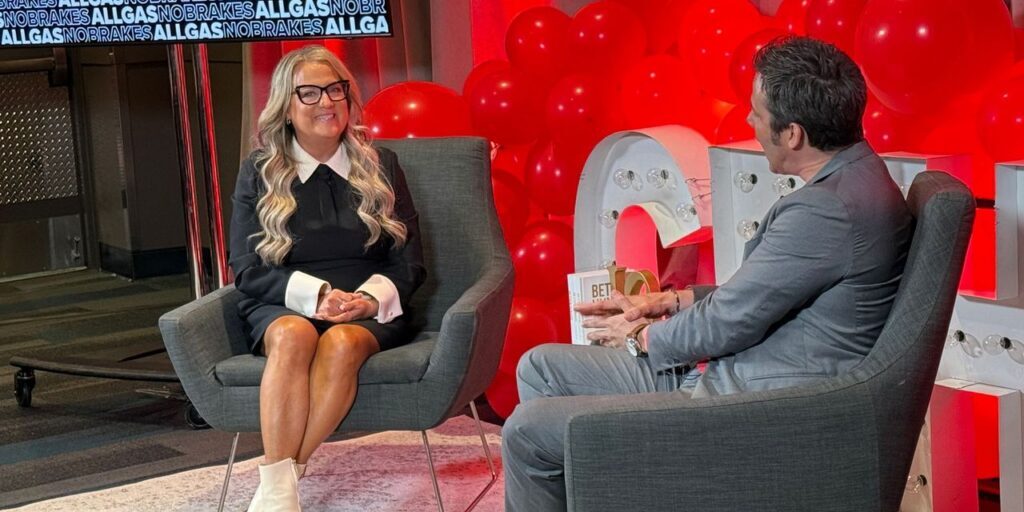Neil Pasricha’s life fell apart 10 years ago. In the span of three weeks, his wife asked for a divorce and one of his closest friends took his own life. These events wrecked him. “I was a disaster,” Neil told me.
But he took refuge in advice his father had given him: “No matter what happens in your life, never forget how lucky you are.” This nugget of wisdom inspired Neil to create his award-winning blog 1,000 Awesome Things. For 1,000 straight weekdays, Neil posted a short essay about something that made him smile during the day. Ten years later Neil is a world class keynote speaker and author whose newest book, “You Are Awesome: How To Navigate Change, Wrestle With Failure, and Live an Intentional Life,” is climbing the best-seller lists.
Neil joined me for a fascinating conversation about his latest book, which I read over the course of one weekend and strongly recommend! Neil does a brilliant job of reminding us why we’re awesome and helping us return to awesome when life gets hard and we lose our way.
Your new book is about resilience. Do you think we have become less resilient?
Yes. Life’s technically so easy. If you look at our history as a species — I’m talking 200,000 years — there’s pretty much no era you can point to that there wasn’t a plague, a famine, a great economic depression or people getting shipped off to war against their will. This is pretty commonplace for most of our history as a species.
Now, none of that’s going on. In fact, you can press a button and a car picks you up from your office, your phone entertains you on the way home and you’ve got takeout waiting on your porch when you get there. Are you kidding me? We live better than kings.
The side effect of having everything is that we are prepared for nothing. If you fall off the jungle gym and break your arm when you’re 6, then you get cut from your baseball team when you’re 9, and then a girl dumps you when you’re 15 — OK, you’ll get through that. Then when those things happen when you’re older — you break a bone, you get dumped out of a relationship, you get cut from a job — you’re a little bit more equipped to handle them. However, if you go through life and the first time you break a limb is when you’re older, the first time you get cut from a team is when you get fired or the first time you get dumped from a relationship is when you get a divorce then you have no internal musculature to handle it.
What can people do to build their resilience muscle?
I always say stuff moves in three problems, and they all start with the letter “P.” The first is psychological. Everyone’s comparing their director’s cut life with the world’s greatest hits. You can’t be the best at it anymore, which is the prescription for anxiety.
Number two is physical. There’s research out of Australia that shows that if you look at a bright screen within an hour of bedtime, you actually don’t produce melatonin, which is the sleep hormone, which helps you get a deep sleep. So if you don’t produce melatonin, then you have low resilience because you had a restless sleep overnight. So in the morning, you reach for your cellphone. But look at it this way. If you drank a bottle of wine before bed every night, you drank a bottle of wine when you woke up in the morning, and you slept with a bottle of wine in your bed, people would call you an alcoholic. These days everyone’s doing that, but with their phones. We don’t seem to think it’s an addiction, but it is.
The third issue is productivity. You can relate to this feeling if you’ve ever taken more than 15 minutes to decide what to watch on Netflix. You don’t know what to do anymore. You’re not doing anything, you’re just deciding what to do.
Learning to cope with failure is a large part of becoming more resilient. How can we get better at failing?
We catastrophize. But there are three questions you can ask yourself to keep from catastrophizing.
Number one is “Will this matter on my deathbed?” We are so good at taking today’s problem and making it seem like our life’s problem. You got a fender bender? You won’t remember it on your deathbed. Your boyfriend of two months broke up with you? You won’t remember it on your deathbed. You have to zoom out. In my book I list the top five regrets of the dying. They’re nothing related to anything anyone cares about. People wish they’d let themselves be happier, or that they’d kept in touch with friends.
The second question is “Can I do something about this?” Well, the good news is, if you can do something about it, good. You can fix it, if you can. And if you can’t — well, you can’t. It’s like the Serenity Prayer: “God, grant me the serenity to accept the things I cannot change, courage to change the things I can, and wisdom to know the difference.”
And the third question is “Is this a story I’m telling myself?” Almost everything you tell yourself in general in life is a story. People say, “I failed my parents.” No, you failed biology. We all do this. It’s hard to do what you’re asking me for, but it’s husking away the stories that are part of our rigid identities and just exploring them over and over and saying, “Is that really true? Is that really true? Is that really true?” Most of the time nothing’s true. We’re all just totally random and chaotic. We’re just flying balls of molecules who are here for 30,000 days. It’s totally random. Nothing’s really in your control, so you may as well just accept that and not be so hard on yourself.
Why do you think we’re so bad at dealing with failure?
There’s a research study by Daniel Gilbert, a psychologist who teaches at Harvard and wrote the book “Stumbling on Happiness.” He went through a rough year. He had a divorce and lost some friends, and he thought, “Oh, man, a year from now I’m going to feel horrible.”
So he did a study. He and his team interviewed 19,000 people, from every age and background across the spectrum. They said, “Number one, how were the last 10 years of your life?” Guess what? Every single person painted a tempestuous portrait of ups and downs and highs and lows. They could catalog their breakups, their jobs and their various moves in detail.
When they were asked how the next 10 years of their life would look like, everybody said the same thing, which is that it will be similar to the last 10 years. We actually suck at predicting the future, and we actually, unfortunately, think it will stay the same. This is why when you’re going through a problem like being fired from your job, you tell yourself, “I’ll never find anything. I’m done. I’m going to be living in my parents’ basement forever.” I tell the story in the book about how I actually fired people while I worked at Walmart. It was one of my jobs in HR. And everyone said the same thing, packing the trunk of their car wondering how this happened to them. But five weeks later, I would bump into them and they all said “It was the best thing that ever happened to me.”
Every single person said that. And look, I’m so thankful for my divorce, because I wouldn’t have met my wife, Leslie. All of these things create the future you. So see it as a step. Part of getting through shame is trying to believe, because it’s true. The research shows it, our stories show it, everyone who’s older will tell you this. It’s just that what you’re going through now is part of what is going to make your future self great. You lost that job? It’s leading to the next one. You lost that relationship? Well, the next one is going to be better. You are learning your textbook chemistry. You are learning what kind of job makes you tick. You are coming closer and closer to your natural resonant frequency of what kind of work you love, but it’s painful to go down that path. And every breakup hurts.
You have a pretty dialed-in morning routine that I know has helped you build your own resiliency muscle, and it’s something I’m a big believer in as well. What is your morning routine?
I believe that everyone should start the day with a two-minute morning practice to strengthen their minds for the day. This means that the first thing you do when you get out of bed is work through three statements. The first is “I will let go of … .” This helps you crystallize and eject anxiety. We know from a lot of research and religions that this actually works. Catholic confession chamber works. But actually, hardly anyone goes to church anymore, so we need to bring this practice of confession into our secular society. The fastest-growing religion in the world, by the way, is no religion, according to National Geographic. Me, personally, I write that I will let go of comparing myself to Tim Ferriss. I will let go of the possibility of my book being a New York Times best-seller. I have to let go of that stuff. I can’t control it.
Number two is “I am grateful for … .” Our brains naturally want to look at the negative. That’s how we evolved. That’s how we took over the planet. Our brains are wired for survival.
The third one is “I will focus on … .” Just write down one thing. At the end of the day, if you can cross one thing off and you say “I did it,” that feels better than writing 100 emails a day and feeling like you did nothing. We all suffer from decision fatigue today. The internet exacerbates it. You have to carve away from the endless list of should do and could do. One thing you actually will do. It’s probably your biggest, hardest, toughest thing. So then you can just cross that off at the end of the day. I’ll use you as an example. Maybe you have a speech at 7 p.m. and you’re in Chicago at 10 a.m. So you, being a high achiever, think, “Oh, I need to go to the gym, and I really want to write this new thing and get back to this podcast.” But let’s say you get none of that stuff done. You were sucked into social media, your girlfriend had a crisis and your flight was late. It’s easy to feel like that day was a flop. But then at the end of the night or the next morning when you look at your list, guess what you wrote down? “I will focus on giving my 7 p.m. speech.” So you cross that off, and you feel incredibly accomplished.
I’d like to extend a heartfelt thanks to Neil for this amazing conversation. Keep your eyes peeled on the blog, where we will feature part two of this conversation, on how we can have a healthier relationship with technology.
Join Ryan for the Resilient Leadership Workshop
In this interactive, 3-hour virtual workshop, Ryan Estis shares the seven principles to resilient leadership that he has developed navigating disruption as a small-business owner and Fortune 500 executive. This course isn’t just about theory, though. Ryan brings each principle alive with real-life case studies and practical exercises to help you put them into action right away.










